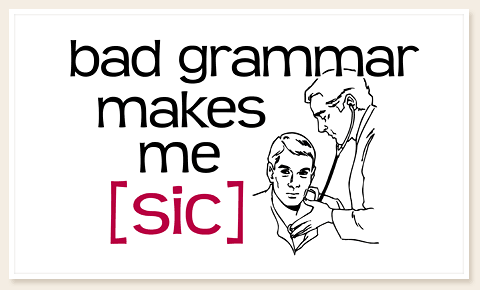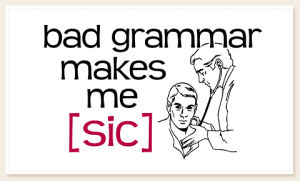
 Anyone who puts pen to paper (or fingers to keyboard) for a living knows how important grammar, punctuation and spelling are. A misplaced apostrophe or a missing comma can spell disaster for a piece of writing.
Anyone who puts pen to paper (or fingers to keyboard) for a living knows how important grammar, punctuation and spelling are. A misplaced apostrophe or a missing comma can spell disaster for a piece of writing.
Even the most hardened grammar vets have blind spots. The problem with practicing good grammar is that it is usually a kind of afterthought to the creative process. When doing the actual writing, it’s easy to make grammatical slips while focusing on the meatier elements of the job.
That’s why careful proofreading is so important. And, if you have the time, letting someone else edit your writing with fresh eyes can save you from the embarrassment of publishing flawed copy.
Most of us have at least one mistake that we keep making over and over. Whether it’s confusing the various forms of “there,” using “its” instead of “it’s,” mixing up “effect” and “affect,” dropping words or composing run-on sentences, we've each got a particular writing foible that's holding us back.
Luckily there are plenty of resources online if you should need to brush up on these kinds of mistakes. For now, let's take some time to consider a few of the more common grammatical mistakes that can seep into your writing. (Definitions courtesy of Grammarly.)
Passive voice
When using the active voice, the subject of the sentence performs the action expressed by the verb. So if you flip that definition, you can spot the passive voice by the object of a sentence being acted upon by the action expressed in the verb. The distinction between the two can be hard to see clearly, so here’s a simple example:
Passive: The house was destroyed by the fire.
Active: The fire destroyed the house.
Some telltale signs of the passive voice are these words or phrases: by the, was, will be. Writing in the active voice will ensure your work is clear to the reader. It also helps keep your sentences nice and short.
Incomplete comparisons
This one can be tricky, because there is often nothing else grammatically wrong in a sentence with an incomplete comparison. To avoid this in your writing, just make sure there’s always a point of reference when you use comparisons. For example:
I like the lake because it's cooler, less noisy and cleaner.
This kind of sentence is easy to breeze by because the writer usually knows what she's talking about, but it's not clear to the reader what the lake is being compared to. For clarity’s sake, make sure you tidy up your comparisons.
Dangling modifiers
You’ll find these in a sentence where the descriptive phrase doesn’t match up with the noun immediately following it, which often causes confusion. For example:
After rising for months, the governor decided to change her policy on unemployment.
This sentence structure causes unnecessary ambiguity. What exactly rose for months? The governor? Or unemployment? In actuality, the sentence is trying to say that unemployment is on the rise. Try flipping the sentence around:
The governor decided to change her policy on unemployment after it had been rising for months.
Follow Mark: @MarkRenfree
To delve deeper into the art of written communications, be sure to attend the PR News Writing Workshop at New York City's Marriott Marquis on Oct. 26.

“This kind of sentence is easy to breeze by because the writer usually knows what she’s talking about, but it’s not clear to the reader what the lake is being compared to.”
Isn’t that a passive sentence?